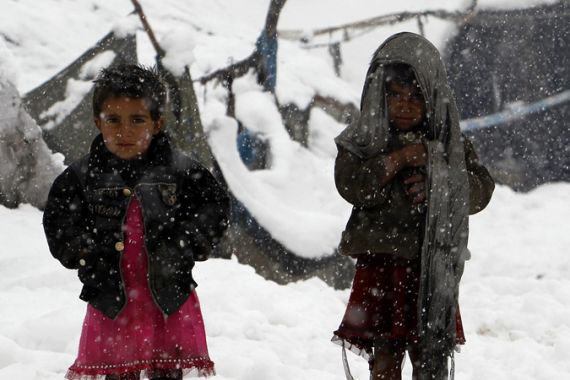Amnesty: Displaced Afghans neglected
Report by rights group accuses government of “callous indifference” towards people forced from homes due to conflict.

Half a million Afghans left displaced and homeless following years of conflict are struggling to survive due to government and international neglect, Amnesty International has said.
In a report titled “Fleeing war, finding misery”, the London-based rights group also accused the Afghan government of “callous indifference” as part of its “de-facto policy of denial” towards internal displacement.
Thursday’s report came after Afghanistan’s harsh winter claimed 40 lives, including at least 28 children who froze to death in camps for internally displaced peoople around capital Kabul.
‘Preventing help’
The government is “not only looking the other way but even preventing help from reaching them,” Horia Mosadiq, an Amnesty researcher said while describing the humanitarian situation in the camps.
“Local officials restrict aid efforts because they want to pretend that these people are going to go away. This is a largely hidden but horrific humanitarian and human rights crisis,” she said.
The Afghan capital alone houses 30 camps where up to 35,000 displaced people live.
The report, based on three years of research, calls on the government to remove hindrances to “ensure that their humanitarian assistance addresses the needs of internally displaced people”.
Slum residents told Amnesty they fled their homes to escape the escalating war which has seen the number of civilian deaths rise steadily to a record of more than 3,000 in 2011, according to UN figures.
Most of the casualties are caused by Taliban fighters, but many of the displaced told Amnesty they fled their homes in fear of NATO bombardment and to avoid being used as human shields by armed groups. Some even fled heeding Taliban warnings that international forces will rape their women upon arriving.
“Afghans have real grounds to feel less secure now than at any point in the last 10 years,” Mosadiq said.
“International and Afghan forces should address the impact of conflict on civilians, including displacement. The Taliban must also look to protect civilians, by ensuring humanitarian access to the areas they control.”
Lack of basic services
Food is scarce in the camps and children in slum communities have little access to education, according to the report.
“Since we came there is no assistance or anything; the family has not eaten anything for the past two days,” a camp dweller named Zarin told Amnesty.
With housing scarce and expensive in the urban centres, families who flee the war construct makeshift dwellings from mud, poles, plywood and plastic sheeting that give them little protection from the cold in winter and heat in summer.
“I don’t know which problem I should talk about – school, unemployment, not having proper housing, food, health – when my children are getting sick and I have to pay for the doctor – it’s everything,” said Fatima, a woman in her 20s living in a Kabul camp.
The report calls on the government to protect displaced people against forced eviction, guarantee their children access to primary education and allow them to be issued with identity cards so they can exercise their legal rights.